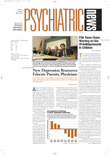Drugs designed to treat psychiatric illnesses may sometimes produce side effects expressed as behavioral changes, yet they are less common than often believed.
“If it crosses the blood-brain barrier, it's likely to have an effect on children's behavior,” according to Gabrielle A. Carlson, M.D., a professor of psychiatry and pediatrics at Stony Brook University School of Medicine.
Although SSRI antidepressants have received most attention recently, Carlson pointed out at a conference sponsored by the American Academy of Child and Adolescent Psychiatry that alcohol and barbiturates can cause aggression, excitement, or irritability, while tricyclics can do the same and induce hallucinations, as well.
The most common effect on behavior is disinhibition, the loss of restraint over social behavior. Such disinhibitions are considered rare, but when they do occur, they are often the result of some combination of a drug, the child, and the psychiatric conditions already present, she said.
Drug combinations, especially antidepressants and alcohol or street drugs, can heighten the risk, as does physical illness. Learning-disabled children or those with degenerative brain diseases are more vulnerable as well, as are children with impulse-control problems, such as those associated with ADHD, bipolar disorder, or borderline personality disorder, Carlson pointed out.
At the same time, it can be hard to find good epidemiological data. Events are uncommon, and only people with psychiatric symptoms get studied, while asymptomatic subjects don't get the same scrutiny. Even in clinical trials, adverse events are not the focus of separate reports, so it is harder to collect information from the medical literature, said Carlson.
The dearth of pediatric drug trials poses other problems. Many drugs are used off-label, because few studies have been done to seek pediatric approvals. “There is so much we don't know about how children metabolize drugs,” she said.
Behavioral side effects of medications in children vary with the drug. Stimulants are approved for patients down to 6 years of age. “Stimulant rebound” describes the greater irritability, sadness, crying, or euphoria after their drugs wear off in the afternoon or evening. Experts say it's hard to find, but clinicians see it all the time, said Carlson. A study of 149 inpatient children found that 60 percent showed no diurnal changes in those symptoms. Of the remainder, many children not on any stimulant did worse in the evening, while others had only “trivial rebound,” depending only on dosage level.
“We need more standardized ways of eliciting side effects from young patients.”
However, a third group, about 21 percent of the total, clearly showed rebound effects that required stopping medication. That, said Carlson, means that clinicians should not be so quick to blame the drug for rebound and discontinue medications without a closer look.
As an example, she cited the case of a child who developed psychotic symptoms after going back on 15 mg of a stimulant after a summer hiatus from school. It was found that the year before, the child had started at 5 mg and had been titrated slowly upward to 10 mg and then 15 mg. But restarting the drug at the full 15 mg dose had produced psychosis. Stopping the drug and then retitrating slowly produced no ill effects.
A second question regarding stimulants is whether they will make children who have both ADHD and bipolar disorder sicker. In her own research, Carlson found that children with ADHD and manic symptoms responded well to methylphenidate during a one-month titration trial. Those with ADHD and bipolar symptoms responded as well as other ADHD children in the 14-month treatment phase.
“Continue to carefully diagnose and treat patients who have some bipolar symptoms and full ADHD,” she said. “Stimulants and combination therapies remain the first choice, but treat mood problems first.”
Rates for activation in trials of SSRIs, of which only fluoxetine and fluvoxamine are approved for use in children, vary from less than 1 percent to 27 percent, clustering around 10 percent. Results of a dozen trials in children provide conflicting data that amount to a “dog's breakfast,” said Carlson.
“There's no common definition of activation,” she said.“ We need more standardized ways of eliciting side effects from young patients.”
Finally, a small study of 76 patients with bipolar depression found that in only 9 percent could a switch from depression to mania be attributed to use of antidepressants. These data are consistent with other studies suggesting that people taking antidepressants have been depressed longer than untreated subjects, but while they are at greater risk for switching, not all bipolar patients will switch on antidepressants. ▪
